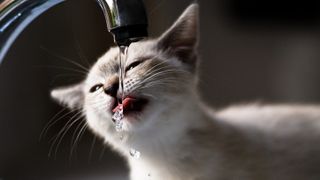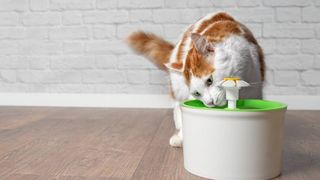Cat drinking a lot of water: Vet's guide to excessive thirst in cats
Our expert vet explains if a cat drinking a lot of water should be a cause for concern

If you notice your cat drinking a lot of water and the behavior is not following your pet’s normal pattern of consumption, then it’s important to dig a little deeper. Although, for the most part, an increased water intake is perfectly innocuous, it can be an indicator of hyperthyroidism, liver disease, diabetes, urinary tract infections or kidney problems. As you can imagine, for the health of your feline friend, it’s crucial to know when a thirsty cat needs a trip to the vet.
Of course, water intake isn’t dangerous in and of itself. Some cats love a cool, refreshing drink and it’s why they will be attracted to the best pet water fountains or, at the very least, a bowl filled with fresh water (both being preferable to cats sipping from toilet bowls and puddles).
However, just like a cat not eating, an increase in thirst is an important issue to get to the bottom of. To help you do this, Dr. Hannah Godfrey is here to explain in more detail the various illnesses which can cause excessive thirst, the symptoms to be on the lookout for and the steps you need to take if you suspect something is wrong. Let's dive in...

Dr Hannah Godfrey studied Veterinary Medicine at the Royal Veterinary College London. After graduating in 2011, Dr Godfrey went on to become a veterinary surgeon, conducting surgery consultations on a range of animals at a small independent practice in Cardiff, South Wales, UK. Dr Godfrey has a strong interest in soft tissue surgery. When she’s not helping animals back on their feet, Dr Godfrey writes a number of veterinary and animal-focussed articles.
How much water should a cat drink a day?
First off, you might be wondering, "how do I know if my cat is drinking too much water?" After all, you can’t be sure that your cat is drinking too much if you don’t know how much they should drink.
Don't worry, though; there is a method to find out. If you can measure how much your cat drinks in a day, your veterinarian will be able to do a simple calculation to decide whether it's excessive. In one day, most cats shouldn’t drink more than 45 ml of water per pound of their body weight. So, an 8 pound cat shouldn't drink more than 363 ml of water in a day. If you measure the amount of water in your cat’s bowl at the start and end of the day, this can provide an accurate estimate of how much your cat is drinking.
Why is my cat drinking a lot of water?
There are many reasons why your cat might be drinking a lot of water. Firstly, it could be normal for them. If they have always drunk a substantial amount of water since they were a kitten, it's less concerning than if there is a sudden change in their thirst.
It's also worth considering whether it's a hot day or whether they’re fed wet or dry food. Cats who are only fed dry food will often have excellent teeth, but they’ll need to drink more than cats who are fed wet food. You can find more information on the pros and cons of the best dry cat food and the best wet cat food in our vet's guide to dry vs wet cat food.
However, some medical conditions can cause your cat to drink more, including hormonal conditions like diabetes and hyperthyroidism, kidney disease, and liver disease.
Should I worry about my cat drinking a lot of water?

Cats don’t usually drink very much, so they tend to keep their hydration at an absolute minimum. There’s some recent evidence to suggest that increasing their water intake might keep their kidneys healthy for longer. Remember, you can encourage your cat to drink more using running water like taps or water fountains.
If your cat suddenly starts drinking substantially more, it could indicate a health problem. Excessive thirst can vary depending on your cat's previous behavior. In some cats, this might mean your cat suddenly spends all their time at the water bowl.
However, for other cats, you might just see your cat drinking, where you never saw them drinking before. If you notice any change in your cat’s thirst, you should make an appointment with your veterinarian.
Is my cat unwell?
To help determine whether your cat's thirst is normal or a sign of them being unwell, keep an eye out for other symptoms. If your cat is extra thirsty, they’ll probably also use the litter box or pee outside more than normal.
Conditions that can cause excessive thirst might also cause changes in your cat’s appetite, vomiting, diarrhea, weight loss, vocalization, or even breathing problems.
So, let's find out what specific symptoms could mean:
1. My cat is drinking a lot of water and losing weight
You may find yourself asking, why is my cat losing weight? If your feline friend is drinking more and losing weight, it might mean that they have hyperthyroidism. Too much thyroid hormone can make your cat really hungry, and they might be more vocal and a bit frantic. Internally, thyroid hormone increases their blood pressure and, over time, can lead to heart failure.
It’s not just hyperthyroidism that causes increased thirst and weight loss. Conditions affecting the kidneys and liver can cause similar signs, but usually without an increased appetite.
Diabetes can sometimes cause weight loss, too. So, you can understand why the veterinarian will need to examine your furry friend and may do some tests before they make a diagnosis.
2. My cat is drinking a lot of water and has diarrhea
If your cat is drinking a lot and has diarrhea, it might just mean that they are replacing the fluid they have lost in their poop. After all, it doesn’t take long for dehydration to set in if your cat has vomiting or diarrhea.
However, keep in mind that although diarrhea isn’t a typical symptom of conditions that cause excessive thirst, every cat is different. So, it’s worth seeking veterinary help if your cat has symptoms of being unwell or their usual habits have changed.
3. My cat is drinking a lot of water and is always hungry

If your cat seems extra thirsty and is always hungry, they might have hyperthyroidism. You might also notice symptoms like vomiting, weight loss, vocalization, hyperactivity, or changes in their breathing.
Hyperthyroidism can be treated in various ways, including medication and surgery. Still, first, your veterinarian will need to do some tests to confirm the diagnosis.
An increased appetite in association with increased thirst can also be a sign of diabetes.
4. My cat is drinking a lot of water and peeing outside their litter tray
If your cat is drinking more and peeing outside of the litter tray, there are a variety of health conditions that could be causing the symptoms. After all, every condition that makes your cat need to drink more will also make them need to pee more often. In addition to diabetes, hyperthyroidism, and kidney and liver problems, it could also be caused by infection or inflammation of the urinary tract. Check out our guide to why is my cat peeing outside the litter box for more advice on this issue.
5. My cat is drinking a lot of water and meowing excessively
If your cat is drinking excessively and meowing, it could mean they have hyperthyroidism. This condition can cause cats to be more vocal while becoming more frantic and sometimes on edge.
This can mean they are more active at times they wouldn't usually be, and sometimes means they're very loud too. Of course, sometimes they’re being more vocal because they feel more hungry and want to be fed, but the vocalizing can also be at random.
When to visit your vet
If you’ve noticed a change in your cat’s drinking behavior, consider whether there are any reasons why they might be drinking more, like warmer weather or a change in food.
If they’re well, it’s also worth keeping an eye on their thirst for a few days to see if it settles and monitoring them for other symptoms. If your cat is unwell, has been drinking more for more than a day or two, or has any other symptoms, you should make an appointment with your veterinarian.
Changes in your cat’s thirst might not seem serious, especially if your feline friend is acting well and has no other symptoms. However, increased thirst could indicate an underlying health problem, and early treatment could make a real difference. So, if you have any concerns about your feline family member’s drinking habits, speak to your veterinarian.
Want to learn more? Find out how to stop a cat from spilling water bowl and how often should I feed my kitten. Or, if you're looking for our cat food roundup, we've put together a list of the best wet cat food: Mouth-watering dishes for your moggy.
PetsRadar Newsletter
Get the best advice, tips and top tech for your beloved Pets
Dr Hannah Godfrey is a small animal vet who graduated from the Royal Veterinary College in 2011 and began work straight away at a busy mixed practice. Initially, she treated all species, but focussed on small animals from 2014. She has a passion for soft tissue surgery, ultrasound, and canine and feline dentistry, having completed additional training in these areas.
